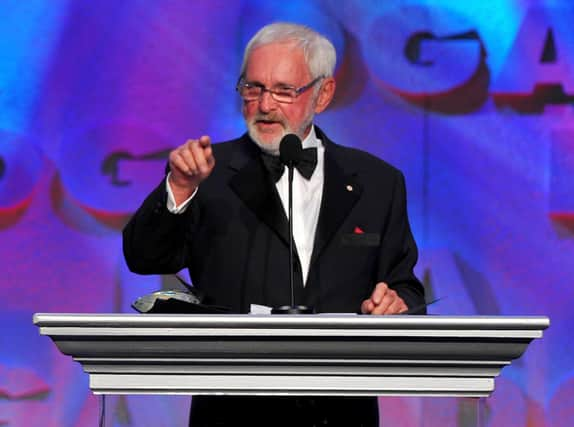Scotsman Obituaries: Norman Jewison, director of In the Heat of the Night and The Thomas Crown Affair


During the Second World War Norman Jewison served alongside black men in the Canadian navy and he saw a lot of them die in the fight against fascism. While on leave and still in uniform, he was traveling in the United States, home of the brave, land of the free, and unthinkingly he sat in the back of a bus.
The driver asked him if he was trying to be funny. He was sitting in the section reserved for black people. Jewison got off the bus and walked away. But he did not walk away from the issue of racism, highlighting it again and again in his work as a film-maker.
Advertisement
Hide AdAdvertisement
Hide AdHe did so most memorably in the Oscar-winning 1967 film In the Heat of the Night, in which Rod Steiger’s southern sheriff clashes with Sidney Poitier’s visiting northerner, without realising he is actually a pretty sharp detective.
Subsequently the redneck sheriff develops a grudging respect for Poitier’s character Virgil Tibbs. “Virgil? That’s a funny name for a n***er boy that comes from Philadelphia. What do they call you up there?” asks the sheriff.
“They call me Mister Tibbs,” Poitier spits back.
The film was a critical and commercial success, both a great thriller and an incisive social critique. It won five Oscars, including best picture, though Jewison lost out on the best director award to Mike Nichols, director of The Graduate.
One of Jewison’s most memorable films was the original version of The Thomas Crown Affair, just one year after In the Heat of the Night. It was widely criticised as a triumph of style over substance. But what style!
As the playboy bank robber, Steve McQueen was the epitome of cool. He and Faye Dunaway were sexier playing chess than any number of actors romping around naked in bed. McQueen’s wardrobe, glider scenes played out against the theme tune The Windmills of Your Mind and Jewison’s use of split screen made this just about the most stylish film of all time.
Jewison made thrillers, he made comedies, he made musicals and he made films with a theme of social injustice. Deeply upset by the political assassinations of the 1960s and the election of Richard Nixon as president, Jewison relocated from California to England and based himself there.
There were further best director Oscar nominations for Fiddler on the Roof in the 1970s and Moonstruck in the 1980s.
His films featured regularly at the Oscars and delivered gongs for others, but Jewison himself eventually had to make do with the Irving G Thalberg lifetime achievement award.
Advertisement
Hide AdAdvertisement
Hide AdPerhaps his very versatility counted against him, along with that early accusation of style over substance. OK, he filmed Jesus Christ Superstar on location in the Holy Land, with tanks coming over the horizon, but why?
With the name Jewison, people assumed throughout his life that he was Jewish. From school days onwards he experienced antisemitism first hand. His parents were Methodists and his ancestry was English. He was born Norman Frederick Jewison in Toronto, where his parents ran a general store.
After service in the navy during the Second World War, he did an arts degree at Toronto University, where he acted in and directed student productions.
He had a brief spell in London, working as a writer and occasional actor at the BBC. Back in North America he produced and directed TV variety shows, first in Canada and then in the US.
He graduated to films in the early 1960s, with the Tony Curtis comedy 40 Pounds of Trouble and a couple of movies with Doris Day.
He moved on to more serious drama when he took over from Sam Peckinpah as director of The Cincinnati Kid, with Steve McQueen and Edward G Robinson as professional poker players.
The film illustrated Jewison’s ability to build up tension, an element that was very much to the fore in In the Heat of the Night.
“This was the first time a black actor was wearing the fancy suit and being looked up to,” said Jewison. “A black man had never slapped a white man back in an American film. We broke that taboo.”
Advertisement
Hide AdAdvertisement
Hide AdShortly after completing filming of In the Heat of the Night Jewison met politician Bobby Kennedy by chance and Kennedy told him he thought it could be an important film at that point in history.
“The US was going through traumatic times with the civil rights movement,” said Jewison. “Cities were being burned down.
“In January 1968 I was given the New York Critics’ Circle award for best drama. And who was presenting but Robert F Kennedy? ‘I told you the timing was right,’ he said.
“Six months later he was dead, just after Martin Luther King’s assassination. I left America afterwards. I said to myself ‘This is a country where they kill off their heroes. I’ve got to get out of here’.”
He returned to the theme of racism in the 1980s in A Soldier’s Story, about the murder of a black soldier in a Louisiana barracks in the 1940s, and in the 1990s in The Hurricane, about the black boxer Rubin Carter who spent two decades in jail for murders he did not commit. Carter was also the subject of a lengthy song by Bob Dylan. Both films starred Denzel Washington.
In the late 1970s Jewison moved back to Ontario, where he had a cattle ranch. He also produced maple syrup on a commercial scale.
He married Margaret Dixon, a model, in 1953. She died in 2004. Norman Jewison is survived by his second wife Lynne and by three children from his first marriage, all of whom work in showbusiness.
Obituaries
If you would like to submit an obituary (800-1000 words preferred, with jpeg image), or have a suggestion for a subject, contact [email protected]